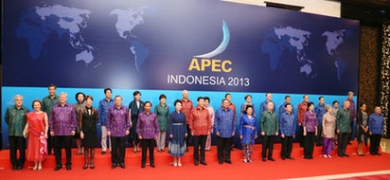Asia-Pacific Economic Cooperation (APEC)
APEC Economic Leaders’ Meeting (Overview and Evaluation)
October 8, 2013

The Asia-Pacific Economic Cooperation (APEC) Economic Leaders’ Meeting was held in Bali, Indonesia on October 7 and 8, with Prime Minister Shinzo Abe representing Japan. Under the chair of H.E. Dr. Susilo Bambang Yudhoyono, President of the Republic of Indonesia, the leaders discussed “the multilateral trading system,” “the promotion of connectivity,” and “sustainable growth with equity.”
As an outcome of the meeting an APEC Economic Leaders’ Declaration titled “Resilient Asia-Pacific, Engine of Global Growth” and a statement on “Supporting the Multilateral Trading System and the 9th Ministerial Conference (MC9) of the World Trade Organization (WTO)” were issued.
1. Outline of the Leaders’ Meeting
(1) Topic 1: The multilateral trading system
(i) As one of the opening speakers, Prime Minister Abe made the following points on the theme of “FTA/ RTAs (Regional Trade Agreements) as building blocks toward a cohesive multilateral trading system.”
- As a result of initiatives for revitalizing the Japanese economy through the steady implementation of “Growth Strategy” etc., Japan is contributing to growth in the APEC region and the global economy.
- An important pillar of the “Growth Strategy” is promoting economic partnership, such as the TPP, the Regional Comprehensive Economic Partnership (RCEP) and the FTA among Japan, China and the Republic of Korea. Japan will utilize its position as a participant in all of these frameworks to actively contribute to discussions on regional economic vitalization.
- An open and non-discriminatory multilateral trading system that is centered on the WTO is important. In order to link regional economic partnership initiatives with WTO activities on liberalization and rule-making, it will be vital to obtain concrete outcomes at MC9 in December, APEC leaders should demonstrate strong political will toward that goal. Additionally, Prime Minister Abe stated negotiation on expanding the Information Technology Agreement (ITA) should be recommenced as soon as possible, and strong message toward the prompt conclusion of the negotiation should be delivered.
(ii) All the leaders who made interventions shared their views that in order to improve economic growth in the APEC region, protectionism should be discouraged and trade and investment liberalization in the region should be moved forward. APEC leaders should demonstrate their strong political will to achieve a successful MC9 and make further progress with the DDA.
(2) Topic 2: The promotion of connectivity
Numbers of leaders shared view that strengthening connectivity in the Asia-Pacific region is conducive to economic growth in the region overall. Leaders expressed their intention to promote connectivity in the region particularly through engagement in areas such as infrastructure development (including roads and ports), IT initiatives, cross boarder education cooperation, disasters responses and promoting tourism, including relaxing visa requirements.
(3) Working lunch: Sustainable growth with equity (food, water and energy security)
Prime Minister Abe noted the importance of agricultural investment based on the “Principles for Responsible Agricultural Investment” and of developing a value chain linking production, processing and distribution.
In addition, he stated that Japan continues to make an active contribution using its experience, knowledge and technology in the water and hygiene areas.
With regard to the energy sector, Prime Minister said that as a pioneer in achieving simultaneously economic growth and improvements in energy conservation and energy efficiency, Japan is moving ahead with sharing highly efficient coal-fired power generation technologies and utilizing Joint Crediting Mechanism, and will continue to contribute to this sector.
(4) Informal Conversation with the leaders of Pacific Island countries
An exchange of views on climate change-related problems such as rising sea levels was held with the leaders etc. of Pacific Island countries, who were invited as guests to this APEC meeting.
2. Partnership with business sector
Prime Minister Abe utilized this APEC Economic Leaders’ Meeting as an opportunity to hold a dialogue with APEC Business Advisory Council (ABAC) members. Additionally, the Prime Minister made a speech on Japanese economic policy at the APEC CEO Summit, which brought together business leaders from the region. The speech was well received.
3. Evaluation of the meetings
(1) It was noteworthy that leaders from the Asia-Pacific Region, the engine of global growth, came together under one roof and issued strong messages to the international community. One of the important elements of the messages was the independent statement reconfirming the importance of the multilateral trading system, reaffirming their commitment to the success of the MC9, and committing to fight against protectionism.
(2) The leaders shared importance of the need to strengthen connectivity in the Asia-Pacific Region and promote a move toward regional integration. Specific contents of cooperation should be explored hereafter.
(3) Furthermore, the ABAC dialogue and the CEO Summit presented opportunities to highlight initiatives for revitalizing the Japanese economy through the implementation of Abenomics, to large audiences including members of the business community.

